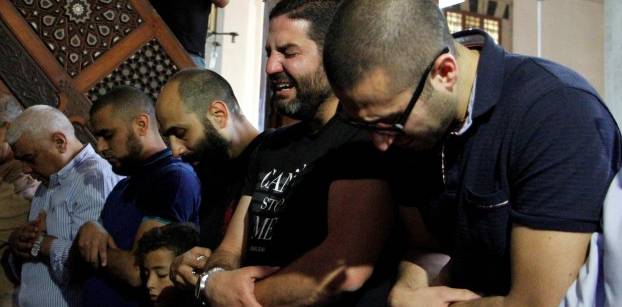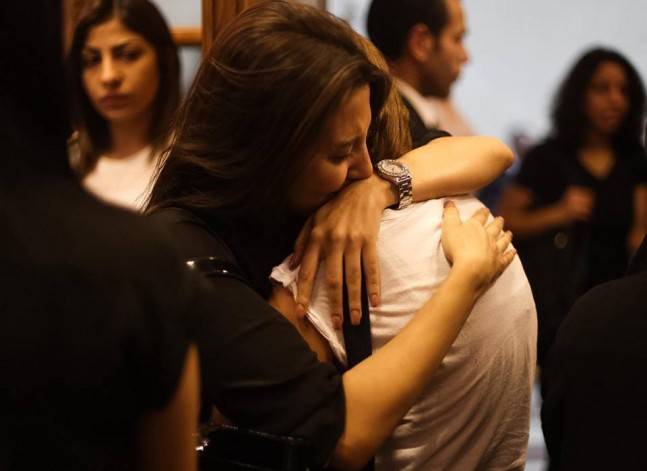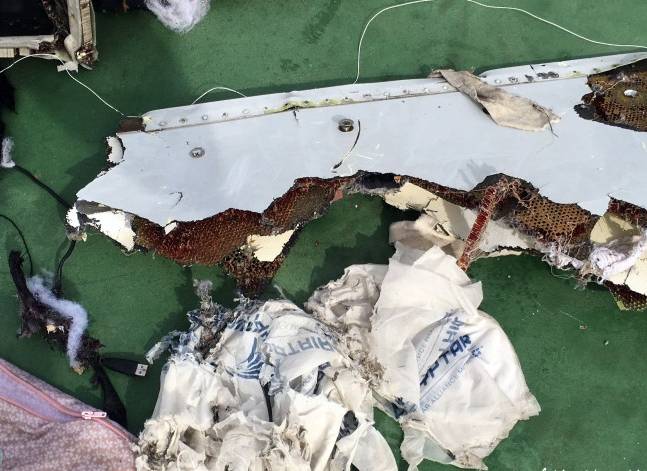Latest NEWS
- Aswat Masriya, the last word
- Roundup of Egypt's press headlines on March 15, 2017
- Roundup of Egypt's press headlines on March 14, 2017
- Former Egyptian President Hosni Mubarak to be released: lawyer
- Roundup of Egypt's press headlines on March 13, 2017
- Egypt's capital set to grow by half a million in 2017
- Egypt's wheat reserves to double with start of harvest -supply min
- Roundup of Egypt's press headlines on March 12, 2017
Documents show EgyptAir plane had no technical problems before takeoff – paper
Relatives of the victims of the missing EgyptAir flight MS804 hold an absentee funeral prayer in a mosque nearby Cairo airport, in Cairo Egypt May 20, 2016. REUTERS/Stringer
CAIRO, May 25 (Aswat Masriya) – An Egyptian state-run newspaper said on Wednesday it obtained documents indicating that the EgyptAir plane that crashed on Thursday had no technical problems before its departure from Charles de Gaulle Airport in Paris.
The 12-year-old Airbus A320-232 jetliner plunged into the Mediterranean en route from Paris to Cairo, and all 56 passengers and 10 crew members who were on board are believed to have been killed.
Al-Ahram newspaper published a scan of the Aircraft Technical Log document signed by an engineer, then the plane’s pilot Mohamed Shoqair at 0830 GMT, indicating that “the aircraft’s technical condition is quite normal.”
The second document published by Ahram shows that that the plane sent 11 "electronic messages" since its engines started at Charles de Gaulle Airport. The first message was sent at 2113 GMT on May 18, shortly before the takeoff, and another one later – both indicating that the engines worked without problems, Ahram said.
But it was at 1226 on May 19 that the plane sent a message saying there is a change in the temperature of the cockpit’s right window, next to the co-pilot, and messages continued to be sent until the plane vanished off the radar, Ahram added, citing the document that it described as “original”.
EgyptAir announced on early morning on May 19 that its flight MS804 vanished off the radar 16 km (10 miles) into Egyptian airspace as it was crossing the Mediterranean at 2:45 AM Cairo time. Cairo time is two hours ahead of GMT.
Debris in the Mediterranean
The Egyptian military said in statements on Friday that its naval forces discovered debris, personal belongings of passengers, luggage, aircraft seats, and body parts in the Mediterranean Sea, 290 km north of Egypt’s coastal city of Alexandria.
The Egypt-led committee investigating the plane crash said in a statement on Tuesday that Egyptian naval vessels continue to search for and retrieve debris at along with French naval vessels. The U.S. embassy in Cairo had announced on May 22 that the U.S. Navy is also taking part in the search in coordination with the Egyptian rescue mission.
The investigation committee said in its statement on Tuesday that 18 debris parts have been retrieved and transferred to crime investigation labs in Cairo. DNA examinations will be conducted and the Egyptian forensics authority will announce the results of the tests within 10 days, the committee added.
The head of the committee was quoted earlier by Ahram as saying that the committee will release a preliminary report in one month presenting all data gathered regarding the plane crash.
Conflicting reports emerged on Tuesday over whether there is evidence to suggest that there was an explosion on board before the crash. Shortly after sources at an investigation committee said that human remains of survivors suggest an explosion erupted, the head of Egypt's forensics dismissed the statements as unfounded and premature.
Black boxes not found yet
The cause behind the crash remains unknown. The plane’s black boxes, pieces of equipment that record details about a flight and help pinpoint the cause of a crash, are yet to be retrieved.
The head of Egypt's Air Accidents Investigation department, Ayman Moqadem was cited in Ahram on Monday as saying that efforts are underway to locate the two boxes guided by the last point at which the plane could be detected on the radar of Cairo’s Air Navigation Center after the plane entered Egyptian airspace. The plane was last detected in an area where Egyptian and Greek airspaces overlap, Moqadem added.
Egypt's top prosecutor asked France and Greece on Monday to hand over to Egypt all data and audio and visual material related to the plane, including during its stay at Charles de Gaulle airport and recordings of the pilot's correspondence with air traffic controllers in Greece.
France, where the plane was manufactured, is taking part in the investigation because it is the country with the second largest number of passengers on board the flight. Three French investigators and a technical expert from Airbus arrived in Cairo Friday morning to join the investigation.
Egypt’s President Abdel Fattah al-Sisi said on Sunday that finding the black boxes is a priority for Egypt, and that an Egyptian robot submarine has been deployed in the Mediterranean for that purpose.
Urging journalists not to make speculations about the crash, Sisi said that “all scenarios are possible” and the investigation may take time.















